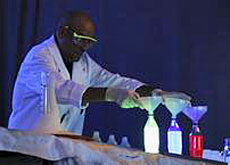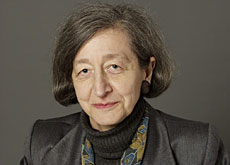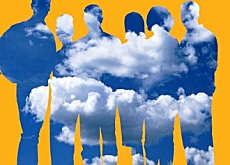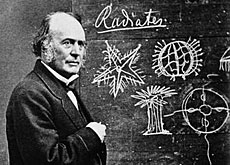White coats reveal human face to public

Zurich's skies reverberated to the sound of flying robots on Friday night as science researchers attempted to win over public scepticism by meeting face-to-face.
Lake Zurich was the venue for a series of public scientific events as Switzerland took part in the Europe-wide Researchers’ Night 2007, presenting the human face of white-coated scientists.
Flying robots were only one of the exhibits that also included health technology, genetics, nanotechnology, cosmic physics, information technology and energy projects such as the Swiss PAC Car that holds the world record for the distance travelled on a litre of fuel.
Passers-by were encouraged to take part in chemistry demonstrations, discover the positive impact science plays in their lives and simply chat to researchers about their work.
Friday was the third time the European Commission had organised the event but the first time Switzerland, in the shape of Zurich University and the Federal Institute of Technology, had participated.
Federal Institute spokesman Matthias Erzinger explained that it was all about building bridges between the public’s admiration of science and concerns about its potential damage.
“For centuries society has been fascinated about science but at the same time people fear it,” he told swissinfo. “A few years ago there were concerns about nuclear research and now about genetics because new things are considered dangerous.”
“We want to show people what science means for their health and future well-being and to have direct contact between the public and researchers to show that they are normal people too.”
Zurich science hotspot
The Federal Institute staged a similar event in Zurich called Worlds of Knowledge during its 150th anniversary celebrations two years ago. The success of that exhibition helped convince scientists to take part in the EC project this year.
Another reason behind the project was to strengthen connections between various scientific research branches in Europe. Switzerland is now fully integrated into the EU’s science research network, allowing better communication and coordination with other European countries.
Erzinger believes that Zurich is now well positioned as one of the leading science centres in Europe because of the work done by the Federal Institute and the University of Zurich.
More and more international technology companies are setting up bases in the city thanks to the reputation of these two universities, he said.
“Zurich is now one of the biggest hotspots for science in the world. We have the IBM research laboratory, the European research laboratory of Microsoft and the Google research centre for Europe,” Erzinger told swissinfo.
“We have a very strong cluster of private and educational institutions that generates a lot of potential, particularly in the fields of natural sciences and medicine.”
swissinfo, Matthew Allen in Zurich
The third edition of the Europe-wide Researchers Night 2007 held in 150 cities in 29 countries, including Zurich, featured 40 different science projects.
It was organised by the European Commission as part of its 7th Framework Programme for Research and Development.
Organisers expected 250,000 visitors throughout Europe, compared with 109,000 last year.
The Swiss Federal Laboratories for Materials Testing and Research (EMPA), IBM Research Zurich and the Zurich Cantonal Bank ZKB also staged exhibitions during the Zurich Researchers’ Night.

In compliance with the JTI standards
More: SWI swissinfo.ch certified by the Journalism Trust Initiative




You can find an overview of ongoing debates with our journalists here. Please join us!
If you want to start a conversation about a topic raised in this article or want to report factual errors, email us at english@swissinfo.ch.